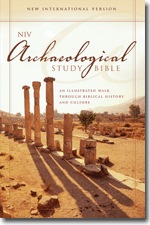Biblical Illustrator Plus: Summer 2009
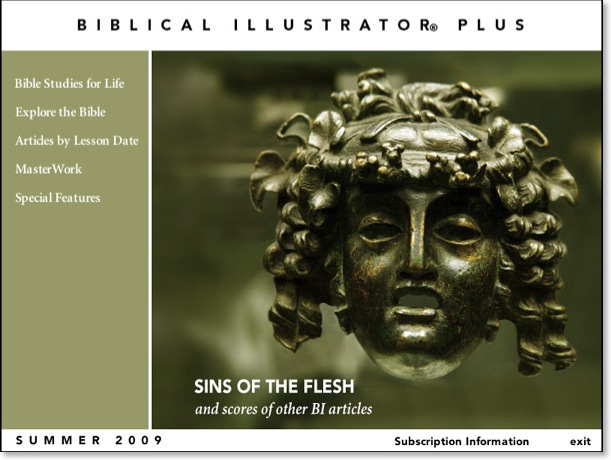
Sunday, I received my new copy of Biblical Illustrator Plus CDROM. I’ve been using Biblical Illustrator for years to help me prepare for the Bible studies I teach on Sunday morning. BI contains background articles that go along with the two main Sunday School curricula used in most Southern Baptist churches. BI is completely separate from the regular teacher’s material, but honestly I value it more. Every quarterly issue contains around 25 articles that offer background information for the biblical texts covered in our studies. The information is usually more detailed than what is offered in the average commentary, but short enough to be digested in one sitting. A working knowledge of biblical languages is not required.
G. B. Howell Jr. is editor of BI. In this newest issue, he is interviewed regarding the role he has played over the past six years. In that interview, he offers a very good description of what BI has to offer:
We continue to offer articles on biblical archaeology, geography, history, people, Greek and Hebrew word studies, and some theology. Every issue has a book review that introduces a new resource to our readers. And we offer a CenterSpread that is art intensive but has an economy of words. ... We have begun offering, though, sidebar boxes with self-contained information (see “St. Catherine’s Monastery,” p. 9). We added a twopage article that addresses some aspect of biblical archaeology, either a find or a site of significance.
The cover of the Summer 2009 issue features a bronze mask of a maenad or female follower of the wine-god Bacchus (Roman, 1st cent. A.D.). In addition to the curricula-related articles, this issue offers a review of Paul Barnett’s book, Paul: Missionary of Jesus. The archaeological article by Joe Cathey focuses on the City of David. The center spread covers the geography of ancient Galatia.
I teach the Explore the Bible curriculum which covers Galatians and James for the months of June - August. Many of the articles that you will see in the table below relate to these books of the Bible. Other articles offer background information for the Bible Studies for Life and MasterWork curricula. Below are the new articles in the current issue of BI:
| Jerry Batson | Anointing in the Early Church | James 5 |
| Joseph Beckler | Abide in John's First Epistle | 1 John 2:3-17 |
| Martha S. Bergen | Jewish Feasts & Festivals | John 7:10-39 |
| Rick Byargeon | Sinai: The Mountain of God | Ex 33:12 - 34:9 |
| Joseph R. Cathey | ARTIfacts: The City of David | |
| Bennie R. Crockett Jr. | Three Social Divisions in the First Century | Gal 3:26-29 |
| Terry Ellis | Sins of the Flesh | Gal 5:16-26 |
| R. D. Fowler | Mirrors | James 1:19-27 |
| John L. Harris | The Book of Jonah in Its Historical Setting | Jonah |
| G. B. Howell Jr. | Paul: Missionary of Jesus by Paul Barnett [book review] | |
| Francis X. Kimmitt | Ancient Culture and Law | Ex 33:12 - 34:9 |
| John Mason | Literacy in the First Century | Galatians, James, 1 Peter, 1 John |
| Allan Moseley | The Tabernacle: Its History and Use | Ex 35:4 - 36:7 |
| Mark Rathel | "Light" in John's Writings | 1 John 1:1 - 2:2 |
| Charles A. Ray Jr. | Genuine Humility | James 4:1-17 |
| C. Mack Roark | James' Ethical Imperatives | James |
| Don H. Stewart | Galatia: Its History | Galatians |
| L. Thomas Strong III | The Social Elite in the First Century | James 2:1-13 |
| J. Mark Terry | Gideon: His Life and Times | Judges 6:11-40 |
| Timothy Trammell | Traveling Through Galatia [center spread] | Galatians |
| Robert A. Weathers | Colossae in the First Century | Col 1:1-29 |
| C. Alan Woodward | The Churches of Galatia | Gal 1 |
The articles above are in both the print issue of BI and the BI Plus CD-ROM. However, the articles below are from previous issues and can be found only on the CD-ROM edition, Biblical Illustrator Plus.
| Scott Andrew | Faith | James 1:3; 2:14; 2 Peter 1:5 |
| Stephen J. Andrews | Sackcloth and Fasting in Jonah | Jonah |
| Stephen J. Andrews | Hazor: A Great City | Josh 10:1 - 12:24 |
| Waylon Bailey | Aaron's Golden Calf | Ex 32:15-19, 30-34; 34:4-6 |
| Bryan E. Beyer | God's Message for Ninevah | Jonah 2:10 - 3:10 |
| James A. Brooks | Gnosticism | 1 John 4:1-3 |
| James A. Brooks | Redemption | 1 Pet 1:18; Eph 1:7 |
| Trent C. Butler | Near Eastern Creation Stories | Genesis |
| James Carter | Old Testament Backgrounds of the Book of James | James |
| Robert O. Coleman | The Fountain | James 3:11 |
| Robert O. Coleman | The Sirocco and the Flower | James 1:11 |
| Bob Dean | The Counselor | John 14-16 |
| David S. Dockery | The Meaning of Deposit | 2 Cor 1:21-22; 5:1-5; Eph 1:11-14 |
| David S. Dockery | To Betray Another | Matt 26:26-56 |
| Charles W. Draper | Law and Faith | Galatians |
| Mark R. Dunn | Counselor: The Meaning | John 14:15-31; 15:26-27; 16:5-15 |
| Mark R. Dunn | Who Were the Samaritans? | John 4:4-26 |
| J. Scott Duvall | Grace | Rom 5:6-17 |
| Kendell H. Easley | The Prison Epistles | Philemon; Colossians |
| Terry W. Eddinger | Ninevah: Assyria's Last Capital | Jonah 4:1-11 |
| Gary Lee Gramling | Paul's Ethical Absolutes | Colossians |
| Sharon H. Gritz | The Betrayer: Judas Iscariot | Matt 26-28 |
| Fred Howard | Prayer: A Word Study | Psalm 28:6-7; Col 4:2-4; 1 Thess 5:16-18; 1 Peter 5:6-7 |
| Paul N. Jackson | A Christian Ethic of Business | James 4:1-17 |
| Robert Earl Jones | Abide: The Meaning | 1 John 2:3-17 |
| Scott Langston | Midian in the Time of the Judges | Judges 4:1 - 9:57 |
| Bill Latta | Gold Rings and Fine Clothing | James 2:2-3 |
| Michael Martin | Fallen from Grace | Gal 5:4 |
| John Mason | Horses: Their First Century Use | James 3:1-5 |
| M. Pierce Matheney Jr. | The Historical Setting for the Book of Jeremiah | Jer 1:4-10; 4:1-4; 6:16-17 |
| David M. May | The Spirit of Restoration | Gal 6:1-10, 14-18 |
| Glenn McCoy | Christ's Second Coming | Heb 9:28; James 5:7 |
| Glenn McCoy | The Royal Law | James 2:1-13 |
| Larry McGraw | Freedom and the Christian | Matt 18:15-17; Gal 5:13-15; 6:1-5 |
| Larry McGraw | The Life Situation of James | James |
| Larry McKinney | The Background of Schoolmaster | Gal 3:1-5, 23 - 4:7 |
| Harold L. McManus | First Century Wars and Their Causes | James 4:1 |
| Warren McWilliams | The Galatian People | Galatians |
| Janice Meier | Gideon: All We Know | Judges 6-8 |
| John Polhill | John's Use of "Witness" | 1 John 5:1-12 |
| John Polhill | The Meaning of "Justified" | Gal 2:11-21 |
| John Polhill | No Respecter of Persons: God's View of Race Relations | Acts 10:34-35 |
| Wayne W. Poplin | Gideon: A Mighty Warrior | Judges 6:11 |
| Gregory T. Pouncey | Libertinism & Legalism | Gal 5:16-26 |
| Michael Priest | Titus and Paul | Titus |
| M. Dean Register | God's Wisdom/Man's Wisdom | 1 Cor 2:1-16 |
| Charles A. Ray Jr. | Antichrist in John's Letters | 1-3 John |
| Charles A. Ray Jr. | Christ and the Kosmos | Phil 2:19-24; James 3:13-16; 1 John 2:15-17 |
| Charles A. Ray Jr. | The Law of Freedom | James 1:22-27; 2:14-18 |
| E. Randy Richards | Stop Lying | Col 3:8-9; James 3:3-12; 1 Pet 3:8-10 |
| C. Mack Roark | Introducing 1 John | 1 John 1:5-10; 2:3-11 |
| Paul E. Robertson | The Churches of Galatia | Galatians |
| David M. Russell | The Colossian Heresies | Col 1:9-23 |
| Billy Simmons | A Religious History of Galatia | Galatians |
| Bob Simmons | The Curse | Gal 3:15 - 4:7 |
| Billy K. Smith | The Meaning of "God's Spirit Moved" | Gen 1:1-5, 31 - 2:1, 15-17 |
| Harold S. Songer | Anointing with Oil: What Does It Mean? | James 5:14 |
| Gerald L. Stevens | "Blaspheme": A Word Study | James 2:1-13 |
| Robert A. Street Jr. | Micah: His Life and Times | |
| Leslie "Thomas" Strong III | Family Life in Ancient Corinth | 1 Cor 7:1-5; 8-16 |
| Roger R. Sullivan | Corinth's Religious Atmosphere | 1 Cor 8:12-13 |
| J. Mark Terry | Jonah's Vine | Jonah 4:1-11 |
| William B. Tolar | A Different Gospel | Gal 1:1-12 |
| William B. Tolar | Paul's Fruit List | Gal 6:16-26 |
| Timothy Trammell | Faith Affirmed | 1 John 5:1-12 |
| Timothy Trammell | The Purpose and Life Situation of John's Letters | 1-3 John |
| Robert A. Weathers | Sexual Purity in the New Testament | Job 31:1-4; Psalm 10:3-4; 2 Cor 10:4-5; 1 Thess 3-5, 7 |
| Elgia "Jay" Wells | Lessons for Race Relations | Acts 10:1-48; 8:26-40 |
| Terry L. Wilder | The Role of a Steward | 1 Peter 4:7-19 |
| Jerry M. Windsor | Grace | Ephesians |
| C. Alan Woodward | Heresies in the Colossian Church | Colossians |
| G. Al Wright Jr. | Testing | James 1:2-4, 9-15, 26-27 |
Now, when I’ve written about BI before, I’ve suggested that it has value even for people who don’t teach from SBC curriculum. Why? Well, the articles provided in each issue are invaluable if one is involved in any aspect of preaching or teaching. Every CD in the “Plus” edition contains almost 100 articles. A couple of years ago, I began copying the articles (all in PDF format) from the CD onto my hard drive. I divide them up by books of the Bible as can be seen below:
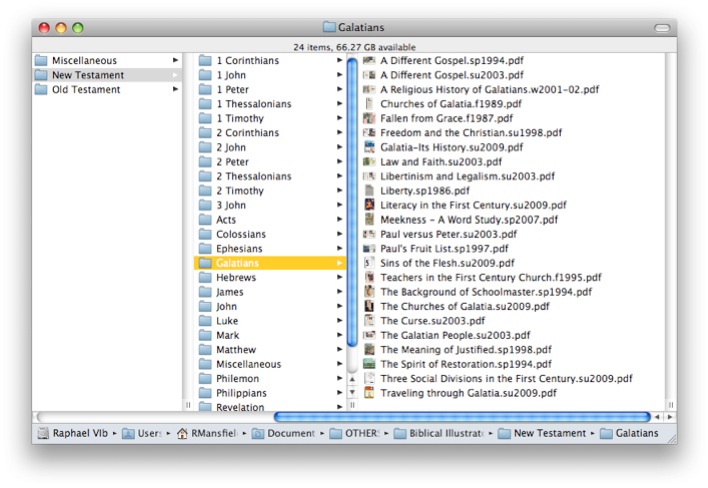
Thus, regardless of whether I’m working on a Sunday School lesson, sermon, college lecture, or some other study of the Bible, I have dozens of background articles at my immediate disposal.
Recently, I’ve started listing articles in my personal notes in Accordance where I do the bulk of my preparation for teaching the Bible. I haven’t completed this project yet, but once I’m finished, I’ll have a running index in biblical order of the articles I have available.
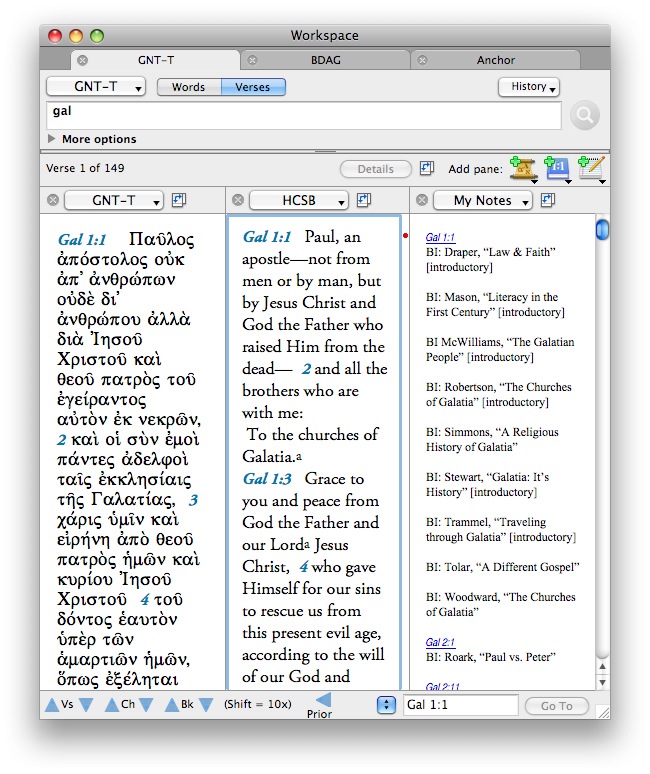
I promise you I receive no commission from Lifeway for promoting BI here on This Lamp! I simply remain very enthusiastic about this resource and highly recommend it to others who are in any kind of teaching or preaching ministry. The print edition is $24.95 a year and the CDROM edition (with all the extra articles from past issues) is $34.95.
Biblical Illustrator Plus: Winter 2007-08
The Back of the CD jewel case has this analysis:
In November 2005, news broke that the world's oldest map had been discovered. The Soleta Map, as it came to be called, was about the size of a postage stamp and showed the location of various cities along the boot heel of Italy. The map dated to about 500 BC. Since its discovery, however, some have suggested that the map may be a modern forgery. If it is a genuine artifact, it's a reminder of how far we have come in map-making technology. GPS systems in our cars can show us exactly where we are on a map. And online electronic satelite maps can zoom in our your backyard or on someone's property half a world away. Those who have studied maps have long noted how cities dot the water sources. Rivers and fresh-water lakes became the home to families, villages, cities, and eventually civilizations. This issue of Biblical Illustrator Plus explores how water affected civilization development and how those civilizations interacted with one another and how they came to know, understand, and relate to God. As you read and study, take time to evaluate where you are--and where you are going.
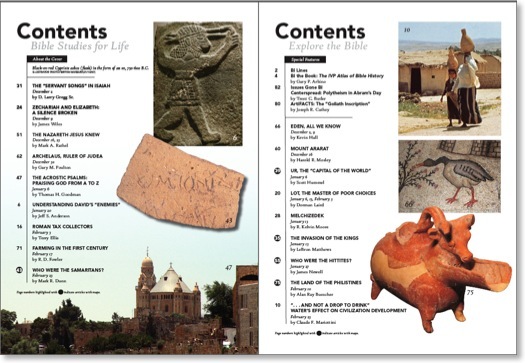
Click the image above for a larger view.
The BI+ CD contains background articles for a number of Lifeway Bible study curriculums. I teach from the "Explore the Bible" curriculum which essentially goes through the entire Bible in eight year cycles. This Fall, a brand new cycle began with our study of Matthew. I'll be honest and say that I was disappointed that we only spent only one quarter in Matthew's gospel. However, I'm very pleased that the corresponding Old Testament study in Genesis will span two quarters. The first book of the Bible is absolutely foundational for everything that comes after it, and I don't believe 50 chapters could have been adequately covered in only three months. Therefore, in the list of new BI articles below, many of them are related to our study of Genesis. Other articles relate to the "Bible Studies for Life" curriculum which looks related to be a study in the Gospels (but I don't have a schedule for that series, so I'm not certain).
Here are the current new articles found in both editions of Biblical Illustrator:
| Jeff S. Anderson | Understanding David's Enemies | Psalm 7 |
| Gary P. Arbino | Book Review: The IVP Atlas of Bible History by Paul Lawrence and Alan Millard | |
| Alan Ray Buescher | The Land of the Philistines | Gen 20-33 |
| Trent C. Butler | Polytheism in Abram's Day | Gen 12:1-9 |
| Joseph R. Cathey | ARTIfacts: The Goliath Inscription | |
| Mark R. Dunn | Who Were the Samaritans? | John 4:4-26 |
| Terry Ellis | Roman Tax Collectors | Luke 15:1-2, 11-24 |
| R. D. Fowler | Farming in the First Century | Luke 10:1-12, 16 |
| Thomas H. Goodman | Praising God from A to Z: The Acrostic Psalms | Psalm 145 |
| D. Larry Gregg Sr. | The Servant Songs in Isaiah | Isa 52:13 - 53:12 |
| Kevin Hall | Eden: All We Know | Gen 2-4 |
| Scott Hummel | Ur: The "Capital of the World" | Gen 11:1-9, 27-32 |
| Dorman Laird | Lot: the Master of Poor Choices | Gen 11, 13, 14, 19 |
| LeBron Matthews | The Invasion of the Kings | Gen 14 |
| Claude F. Mariottini | "...and Not a Drop to Drink": Water's Effect on Civilization Development | Gen 26 |
| R. Kelvin Moore | Melchizedek | Gen 14 |
| Harold R. Mosley | Mt. Ararat | Gen 8 |
| James Newell | Who Were the Hittites? | Gen 15, 23, 26 |
| Gary M. Poulton | Archaelaus: Ruler of Judea | Matt 2:1-23 |
| Mark A. Rathel | The Nazareth Jesus Knew | Luke 1-2 |
| James Wiles | Zechariah and Elizabeth: A Silence Broken | Luke 1:5-25, 57-80 |
For those fortunate enough (which includes me) to have the Biblical Illustrator Plus CDROM, dozens of articles from previous issues are included as well. In addition to Explore the Bible and Bible Studies for Life, these archived articles also support Lifeway's other curriculums such as MasterWork and the January Bible Study (Romans).
| N/A | Samaria in Jesus' Day | N/A |
| Jeff S. Anderson | King's Privileges or King's Crimes? | 2 Sam 11:1-5, 14-17 |
| Waylon Bailey | Languages of the Ancient Near East | Gen 11:6-7 |
| Albert Bean | The Arm of the Lord | Isa 53:1-12 |
| Albert Bean | Chesed Love | Psalm 86:1-17 |
| Martha S. Bergen | Rome: The Growth of the Eternal City | Romans |
| Robert Bergen | Potiphar in Egyptian Society | Gen 39:1-23 |
| Bryan E. Beyer | The Practice of Covenant Making | Gen 12:1-3; 15:1-18 |
| Ronald E. Bishop | Isaac | Gen 17:19; 22:2; 24:4, 67; 25:11a |
| Steve Booth | Of Inns and Inns | Luke 2:1-20; 10:25-37 |
| Bennie R. Crockett Jr | Immanuel | Matt 1:18-23; 2:1-2, 10-11 |
| Rick Davis | Destroyed Relationships | Gen 3:1-24 |
| Bob Dean | Paul's Use of the Old Testament in Romans | Romans |
| Robert J. Dean | Roads and Travel in the First Century | Luke 1:26-35; 2:4-7 |
| Joel Drinkard | Beersheba | Gen 26:12-33 |
| Bob Dunston | The Hills and the Valley | Gen 13:1-18 |
| Wayne Etheridge | Admah and Zeboiim | Gen 9:24-29 |
| Gary Lee Gramling | The Samaritans | John 4:7, 9-15, 28-30, 39-40 |
| Elmer L. Gray | Capital Punishment in the Ancient Near East | Gen 9:6 |
| Sharon H. Gritz | Life for a First Century Housewife | Luke 15:1-10 |
| Sharon H. Gritz | The "Word" in John's Gospel | John 1:1-18 |
| George H. Guthrie | First-Century Roman Government | Rom 13:1-14 |
| Stephen Z. Hearne | Forgiveness in the New Testament | Matt 18:21 |
| Norma S. Hedin | Birth Rituals of the First Century | Luke 2:8-20, 36-38 |
| Gene Henderson | A Description of Noah's Ark | Gen 6:1 - 8:22 |
| Timothy Paul Jones | The Meaning of "Raca" | Matt 5:21-26 |
| Francis X. Kimmitt | Ancient Near Eastern Flood Stories | Gen 8:20 - 9:17 |
| Thomas D. Lea | The Early Church's Use of Messianic Passages | Isa 53; Acts 28:23 |
| Jerry W. Lee | The Dust of the Ground | Gen 2:4-25 |
| David C. Maltsberger | Where Is Mt. Moriah? | Gen 21:1-7; 22:6-8, 15-18 |
| Claude Mariottini | Canaan in Patriarchal Times | Gen 12 |
| John Mason | Love's Abiding Nature | 1 Cor 12:31b - 13:13 |
| John Mason | Sychar and Jacob's Well | John 4:1-45 |
| David M. May | The Spirit of Restoration | Gal 6:1-10, 14-18 |
| T. Van McClain | Abraham's Homeland | Gen 12:1-20 |
| Glenn McCoy | First Century Priesthood | Luke 1:1-80 |
| Glenn McCoy | Introduction to Romans | Romans |
| Daniel R. McGee | The Servant Songs in Isaiah | Isa 53:1-11 |
| Larry McGraw | The Meaning of Violence | Gen 6:11-13; Psalm 55:9-11; Jonah 3:6-10; 1 Pet 3:9-12 |
| Warren McWilliams | The Galatian People | Galatians |
| Warren McWilliams | Grief Practices in New Testament Times | Psalm 23:4; John 11:24-26; 1 Thess 4:13-18; Rev 21:4 |
| Allan Moseley | David and Absalom: A Family Tragedy | Gen 50:17; 2 Sam 19:4, 7-8; Luke 15:20-24; Eph 4:32 |
| Allan Moseley | Who Were the Philistines? | 1 Samuel |
| Harold R. Mosley | In God's Image | Gen 1:1 - 2:23 |
| Harold R. Mosley | Zoar | Gen 18-19 |
| Timothy L. Noel | Jewish Inheritance Laws | Luke 15:25-30 |
| John Polhill | Paul and the Romans | Romans |
| Michael Priest | To "Tabernacle" | John 1:1-18 |
| Carolyn Ratcliffe | Messianic Expectations in Intertestamental Judaism | Luke 1:26-38; Matt 1:18-25 |
| Charles A. Ray | Nero: Ruler of Rome | Romans 13:1-14 |
| C. Mack Roark | Forgiveness & the Jewish Tradition | Matt 18 |
| C. Mack Roark | Martha of Bethany | Luke 9:51 - 10:42 |
| Glenn E. Robertson | Jewish Teachings on Forgiveness | Matt 18:1-9; 21-22 |
| Glenn E. Robertson | Was John the Baptist a Nazirite? | Luke 1:5-25, 57-80 |
| Bob Ross | Journey to Bethlehem | Luke 2:1-7 |
| Thomas Sawyer | Feasting: First Century Practices | John 12:2; Luke 7:37; 15:23 |
| W. Murray Severance | Fiery Darts | Eph 6:16 |
| George H. Shaddix | Ancient Altars | Gen 8:15 - 9:11 |
| Bob Simmons | The Curse | Gal 3:15 - 4:7 |
| T. C. Smith | A Convenient Theology | Job 8:6; Psalm 145:15-20 |
| Don H. Stewart | Obedient Joseph | Matt 1:18-25; 2:13-23 |
| Robert A. Street | Deceiver | Gen 25-33 |
| Robert A. Street | Haran | Genesis |
| Philip J. Swanson | Esau and the Edomites | Gen 32 |
| J. Rodney Taylor | Noah in Jewish Folklore | Gen 5:28 - 9:29 |
| John Mark Terry | Absalom: David's Son | 2 Sam 13-19 |
| John Mark Terry | Eliezer: Faithful Steward | Gen 15:2 |
| William Tolar | A Different Gospel | Gen 1:6-7; 2:11-21 |
| William Tolar | Jews in First Century Rome | Romans |
| Wayne VanHorn | Curses and Blessings in the Old Testament | Gen 2:15 - 3:24 |
| Fred M. Wood | Abimelech | Genesis |
| Fred M. Wood | My Brother's Keeper | Gen 4:1-26 |
| Fred M. Wood | Valley of Gerar | Genesis |
| R. Garland Young | Naming a Child | Luke 1:5-13, 24-25, 59-64 |
Biblical Illustrator Magazine is available by subscription for $24.95 and Biblical Illustrator Plus CDROM for $34.35. I highly recommend it even if you don't use these curriculums simply to build up a personal library of biblical backgrounds articles.
From the Patriarchs to Patmos: BI Time Line of the Bible
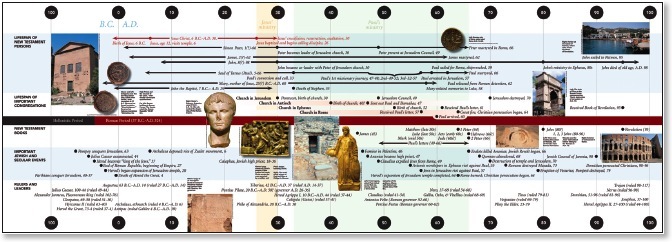
Regular readers of This Lamp are aware that I'm a fan of Biblical Illustrator magazine as a tool for Bible study preparation. Well the editors of BI have just released a wonderful set of new teaching aids: The Biblical Illustrator Time Line of the Bible. This is a set of three individual timeline charts (two for the Old Testament and one for the New Testament) that graphically illustrate the history of biblical events as well as related history of the Ancient Near East.
The two OT timelines cover events from 2100 BC (roughly the time of Abraham forward) to 100 BC. The OT timelines are broken down by divisions: religious events, military and political events, lifespans of important persons, archaeological eras, Palestine, Mesopotamia, involvement with other nations, and Bible books.
The NT timeline begins at 100 BC and ends at AD 100. NT divisions include lifespans of NT persons, lifespan of important congregations, archaeological eras, NT books, important Jewish and secular events, and rulers and leaders.
The three timelines themselves measure 17" x 48.5" each. They are full-color matching the professional look of regular Biblical Illustrator articles and charts. Don't tell the folks at Lifeway I said this, but at $9.95, I actually believe they are underpriced.
When I teach at church, I always include historical context. There's always an appropriate map on the wall to go along with our study. Now that I have these timelines, I'm going to laminate them and leave them indefinitely on the wall of the main room I teach from at church.
If you teach the Bible regularly in any church or classroom setting, I highly recommend these timelines. You can find them at any Lifeway store or you can order them online.
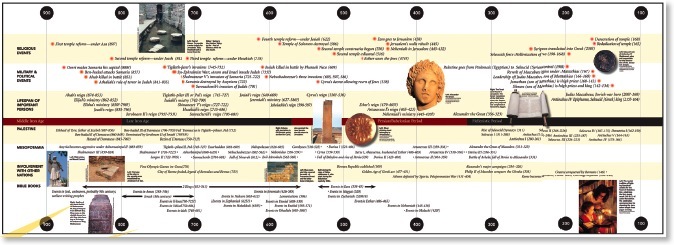
Nifty Leopard Tricks: Cover Flow
Check out the Cover Flow view of Biblical Illustrator files below. Be sure to click on the image to see it full size.
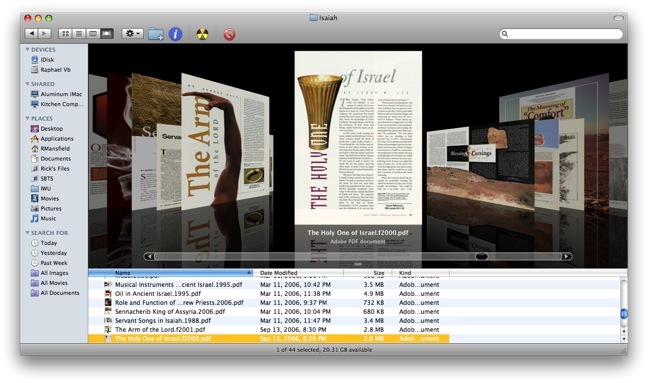
Way cool!
Biblical Illustrator Plus: Fall 2007
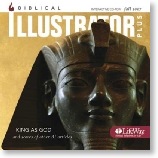
I highly recommend Biblical Illustrator for any student of the Bible's history. The articles are accessible for anyone of almost any background. Even if one has access to journals and such works as the Anchor Bible Dictionary (a favorite of mine), BI is sometimes a faster and more specific resource. And although I could not imagine preparing a Sunday School lesson without it, BI is also valuable for those not using Lifeway's curriculum. Every quarter I take all the articles on the CD (which are in PDF format) and organize them onto my computer's hard drive by biblical book. Then whenever I am preparing a sermon, Bible study, doing research, or anything in which I would need to access historical information about biblical ideas and customs, I have scores of articles at my disposal.
The cover of the Fall issue of BI contains a photograph of the "statue of Amenophis III from his mortuary temple on the West Bank at Thebes, famous for the so-called 'Colossi of Memnon.' Amenophis III was the first Egyptian king to be worshiped as a god in his own lifetime. Eighteenth dynasty, about 1350 B.C." The image relates to the article "King as God" by Joel F. Drinkard, Jr.
The back cover of the CD-ROM case contains these thoughts:
"The God said, 'Let us make man in Our image, according to Our likeness' ...
So God created man in His own image;
He created him in the image of God;
He created them male and female."
--Genesis 1:26-27, HCSB
How simple and yet profound! "Created" changes our origin and destiny. "In His own image" affects our understanding of human dignity, worth, and potential.
Of all creation, God created human beings in His image. That unique feature has compelled mankind to seek, to know, and to worship Him. But, how we have messed that up! People have worshiped everything from nature to creatively fashioned idols. Some have even worshiped man as god. In all of those cases, mankind has missed it.
But "In these last days, [God] has spoken to us by His Son, whom He has appointed heir of all things and through whom He made the universe. He is the radiance of His glroy, the exact expression of His nature, and He sustains all things by His powerful word. After making purification for sins, He sat down at the right hand of the Majesty on high" (Heb. 1:2-3, HCSB). In Him alone do we find worship satisfaction.
Below are the new articles in the Fall 2007 issue of Biblical Illustrator:
| Andrews, Stephen J. | Book Review: Bible Archaeology: An Exploration of the History and Culture of Early Civilizations by Alfred Hoerth and John McRay | |
| Bergen, Robert | Jerusalem's Fall to the Babylonians | Dan 1 |
| Beyer, Bryan E. | Who Were the Medes? | Dan 5 |
| Booth, Steve | Who Were the "Sinners"? | Matt 9, 11, 25 |
| Capes, David B. | First Century Capernaum | Matt 4, 8, 12 |
| Drinkard, Joel F. | The King as God in the Ancient Near East and Israel | Dan 3 |
| Eddinger, Terry W. | Kings and Kingdoms in Daniel's Time | Book of Daniel |
| Gonzalez, Rudy | Almsgiving: Its Use and Abuse | Matt 6:1-18 |
| Gritz, Sharon H. | Judas Iscariot, the Betrayer | Matt 26-28 |
| Jackson, Paul N. | The Righteousness of the Scribes and Pharisees | Matt 5:13-20 |
| Kelly, Bobby | Matthew and His Gospel | Matt 1-2 |
| Lane, Hal | Stranger: A Word Study | Matt 25:31-46 |
| McCoy, Glenn | Joseph the Carpenter | Matt 1, 2, 13 |
| Polhill, John | You Have Heard It Said: Jewish Laws Behind Jesus' Teachings | Matt 5:21-48 |
| Ray, Charles A. | John the Baptist: His Life and Ministry | Matt 3, 11, 14 |
| Roark, C. Mack | Forgiveness and the Jewish Tradition | Matt 18 |
| Stevens, Gerald L. | Divorce in the First Century | Matt 1, 5, 19 |
| VanHorn, Wayne | Belshazzar: All We Know | Dan 5:1-31 |
| Ward, Patrick D. | The "John the Baptist Cave" [ARTifacts] | |
| Weathers, Robert A. | The "Kingdom of Heaven" in Matthew | Matt 12, 13, 16, 19 |
| Wilder, Terry L. | What About the Gospel of Judas? | |
| [CenterSpread] | The Messiah's Ministry: An Account by Matthew |
The articles above are in both the print issue of BI and the BI Plus CD-ROM. However, the articles below are from previous issues and can be found only on the CD-ROM edition.
| Arnold, Stuart | Debtor's Slavery | Matt 18:21-35 |
| Bailey, John | Jesus as "Prophet" | Matt 21:4-14 |
| Boyd, Timothy N. | The Disciples in History and Tradition | Matt 9:36 - 10:1, 27-29 |
| Brooks, James A. | Lawyer and Scribe in the First Century | Luke 10:25; Matt 5:20; 23:1, 23, 27 |
| Caldwell, Daniel | Babylonian and Persian Kings | Dan 3:1-30 |
| Carter, Terry | A Talent | Matt 18:21-35; 25:14-30 |
| Champy III, Harry D. | Belshazzar: All We Know | Dan 5:1-7, 25-28 |
| Cheavens, Alice D. | The Roman Mile | Matt 5:41 |
| Cole, Dennis | First Century Bethlehem | Matt 2:1-12 |
| Cook, Donald E. | Jesus' Use of Parables | Isa 5:1-7 |
| Cook III, William F. | Lamps in Ancient Israel | Matt 5:13-20 |
| Davis, Conn | House Construction in Jesus' Time | Matt 7:24-29 |
| Dehoney, Wayne | The Place of Jesus' "Sermon" | |
| Draper, Charles W. | The Heavenly Host | Ps 148:2-5; 103:20-21 |
| Drinkard, Joel | The Spoils of War | Dan 1:3-5, 8-16 |
| Drinkard, Joel | Wealth, Trade, Money & Coinage in the Ancient World | Prov 16:16; 22:4; 28:20 |
| Dunn, Mark R. | The Blind in Jesus' Day | Matt 9:18-38; 15:16-20 |
| Fowler, R. D. | Zebedee the Fisherman | Matt 20:20-28; Rom 12:9-13 |
| Easley, Kendall H. | Commerce in First-Century Israel | Matt 13:24-52 |
| Easley, Kendall H. | Prayer Customs in First Century Judaism | Matt 6:5-15 |
| Evans, Bob | The Practice of Making Oaths | Matt 5:27-37 |
| Green, Joe | The Learning and Wisdom of Chaldea | Dan 1:17 |
| Gregg Sr., D. Larry | The House of Herod | Isa 9:6-7; Matt 1:18-23; 2:1-2, 9-11 |
| Gritz, Sharon | Kingdom of God in Intertestamental Judaism | Matt 13:1-23; 13:24-52; 16:13-28 |
| Gritz, Sharon | Pilate's Power and Authority | Matt 28 |
| Haag, H. Joseph | The Early Church's View of Poverty | John 12:5; James 2:15-16 |
| Hall, Kevin | Apocalyptic Literature | Books of Daniel and Revelation |
| Hankins, L. Milton | Beams & Motes | Matt 7:1-12 |
| Huckaby, Gary C. | Caesarea Philippi | Matt 16:13 |
| Jackson, Paul | Jesus' Last 40 Days | Matt 28:1-10 |
| Jones, Timothy Paul | The Meaning of "Raca" | Matt 5:21-26 |
| Knight, George W. | The Galilee Boat | Matt 14:22-33 |
| Knowles, Julie Nall | The Church's Use of the Model Prayer | Matt 6:9-15 |
| Lain, Gil | Ancient Storage Facilities | Matt 6:26 |
| Lain, Gil | Early Ships and Boats | Matt 14:29 |
| Lane, Hal | Worry: a Word Study | Matt 6:25-34 |
| Lanier, David E. | Salt in Ancient Israel | Matt 5:1-16 |
| Lemke, Steve W. | "Falling Away" or "Erring" from the Faith? | 1 Tim 4:1; 6:10 |
| McCoy, Glenn | God as Heavenly Father | Matt 5:45, 48 |
| McCoy, Glenn | The Mount of Transfiguration | Matt 17:1-13 |
| McGraw, Larry | God's Angelic Messengers in the New Testament | Psalm 103:20-21; Matt 13:39-42; Mark 13:26-27; Acts 12:7-9, 11; 27:23-24 |
| McWilliams, Warren | Predestination: Time and Space | Matt 6:8 |
| Miller, Stephen R. | Capital Punishment in the Ancient Near East | Dan 3; Esth 4:11 |
| Miller, Stephen R. | The Neo-Babylonian Empire | Book of Daniel |
| Moseley, Allan | Shadrach, Meshach, and Abednego: All We Know | Dan 1:8, 14-17; 3:17-18, 26-28 |
| Parsons, Mikeal C. | The Holy Spirit: A History of Interpretation | Rom 5:5 |
| Patterson, Bill | Divorce in First Century Israel | Matt 19:4-6, 10-12; Rom 16:3-5a; 1 Cor 7:7-9, 32-35; Eph 5:21-22, 25 |
| Peacock, Kevin C. | The Battle of Carchemish | Books of Ezekiel and Daniel |
| Poulton, Gary | The Roman Military in Jesus' Day | Matt 8:1-13 |
| Pouncey, Greg | Who Were the Magi? | Matt 2:1-23 |
| Rathel, Mark | Salvation: A Word Study | Luke 2:25-38 |
| Reeves, Rodney | Mourning the Dead in the First Century | Matt 9:18-31; 36-38 |
| Register, Dean N. | Jesus as the Son of God | Matt 3:17; 4:3 |
| Roberts, Sharon | Pearls in the Ancient World | |
| Robertson, Paul E. | The Love of Money | 1 Tim 6:10 |
| Robinson, Dale G. | The Trumpet in the New Testament | Matt 24:3-6, 29-31, 42-47 |
| Sandlin, Bryce | A History of Darius I | Dan 6:1-28 |
| Simmons, Billy E. | Poverty and Wealth in the Early Church | Matt 6:1-18 |
| Tench, Tony | The Pure in Heart | Matt 5:3-12 |
| Trammell, Timothy | Introducing Matthew's Gospel | Matt 2:1-12 |
| Ward, Patrick D. | City Gates in Jesus' Day | Matt 7:13-29 |
| Ward, Patrick D. | Jesus' Early Life | |
| Warren, William | Our English Bible | |
| Wood, Darryl | Prayer: Its History and Use | 1 Thess 5:17 |
| Woodward, C. Alan | Annas and Caiaphas | Matt 26:1-56; John 18:15-27; 19:1-42 |
| Woodward, C. Alan | "Mammon" | Matt 6:19-24 |
Finally, I was honored to be quoted in an ad for Biblical Illustrator appearing in one of Lifeway's publications this quarter. Here is a reproduction of the ad below. Click on the image to see a larger version.
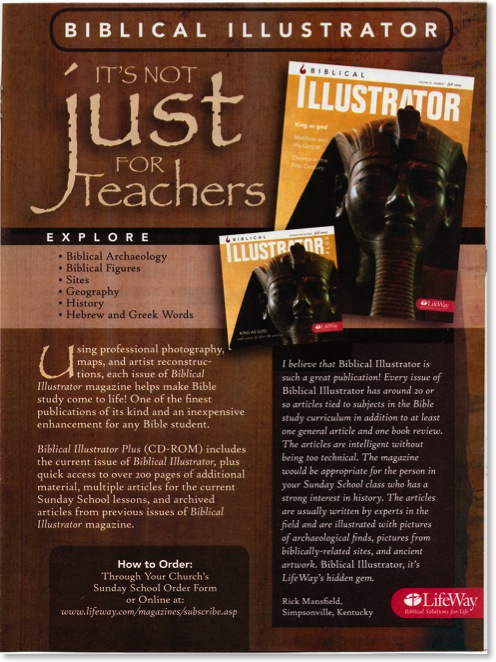
Biblical Illustrator Plus: Summer 2007
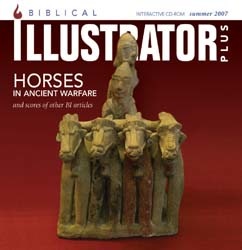
It's just dirt. Some believe that. But what people do with that dirt makes a huge difference. In some large metropolitan cities, land is being sold, not by the acre, but by the square foot. Location does matter.
This issue of Biblical Illustrator Plus looks at dirt and location and what happened at those locations. It looks at the Land of Promise that God gave His people. It looks at events that occurred in specific locations and at people from specific regions. This issue looks at those who built buildings and empires on that dirt--some for worship, some for self-aggrandizement. And we look at how some of those empires rose and waned.
People feel a kinship to the dirt, to the land, to its peoples, and to its cultures and traditions. In the end, though, may we remember that what matters is what we do for God and how we honor Him.
As I've mentioned before, Biblical Illustrator contains background articles for a number of Lifeway's Sunday School curriculums. The class I teach at Simpsonville Baptist Church uses the Explore the Bible curriculum, and this quarter we will take our lessons from the Minor Prophets of the Old Testament. The articles below that are drawn from the Minor Prophets directly relate to the texts I'll be teaching.
Below are the new articles in the Summer 2007 issue of Biblical Illustrator:
| Ken Cox | The Promised Land: A Crucial Locale | Deut 1-5 |
| R. Raymond Lloyd | Who Were the Amorites ? | Book of Deuteronomy |
| Rick W. Byargeon | The Cities of Refuge | Deut 4-5 |
| David L. Jenkins | What Happened at Ebal and Gerizim? | Deut 27-34 |
| C. Alan Woodward | Temple Personnel in the First Century | Acts 2:41-47; 4:1-37 |
| Timothy Trammel | Joppa: Its History and Significance |
Acts 9-11 |
| Stephen W. Carlson | Do You Believe in Magic? | Acts 13-14 |
| David E. Lanier | The Synagogue in the First Century | Acts 13-15 |
| Paul E. Kullman | The Synagogue: Its Design and Construction | Acts 13-15 |
| LeBron Matthews | Solomon in All His Splendor | 1 Kings 3:1-28 |
| John Traylor | The Allure of Baal | 1 Kings 19; 2 Kings 23 |
| Alan Moseley | Locusts! | Joel 1-3 |
| John Mark Terry | The Early and Latter Rains | Joel 1-3 |
| John L. Harris | The Day of the Lord | Books of Joel and Obadiah; Zeph 1-2; Zech 14 |
| Robert C. Dunston | Nahum: Getting His Message Across | Book of Nahum |
| Wayne VanHorn | The World Situation According to the 7th Century Prophets | Books of Nahum, Habakkuk & Zephaniah |
| David M. Wallace | Idols in Production and Ritual | Hab 1:1 - 3:19; Deut 4-5 |
| Martha S. Bergen | Zechariah and Haggai: Motivators and Builders | Books of Haggai & Zechariah |
| Robert A. Street | Zechariah's Visions and Oracles | Zech 1-8 |
| Jeff S. Anderson | The Spritiual Climate at the End of the Old Testament Era | Book of Malachi |
| Daniel P. Caldwell | Horses in Ancient Warfare | Books of Nahum, Habakkuk, Haggai & Zechariah |
| Eric A. Mitchell | ARTIFacts: Giants in the Land: Southern Baptists and Biblical Archaeology | |
| D. Larry Craig | Book Review: Kregel Dictionary of the Bible and Theology by Henry W. Holloman |
Now, as I've said many times, the best value of Biblical Illustrator lies in the CD: Biblical Illustrator Plus. In addition to the articles above, the CD contains over sixty articles from past issues. Additional articles in the Summer 2007 are listed below.
| Bob Simmons | Corinth: A Roman City | 1 & 2 Corinthians |
| Robert Street | Josiah: Rebuilder and Reformer | 2 Kings 21:1 - 23:5 |
| Charles W. Draper | Law & Faith | Book of Galatians |
| Bryan E. Beyer | Evil: the Meaning | Gen 3:1-6; Isa 5:20-21; Mal 2:16 |
| Bryce Sandlin | The Life Situation of Zechariah | Zech 3:1-2, 6-8; 4:1-6, 8-10a |
| Vernon Elmore | The Life Situation of Obadiah |
Obadiah 1-4, 8-10, 8-10, 13-17 |
| Fred Wood | Life Situation in Malachi | Mal 1:6-9; 2:8-9, 13-16 |
| James Travis | Historical Setting of Nahum | Nah 1:1-3a, 7-9, 12-15; 3:5-7 |
| Harold Moseley | Israel and the Nations | Minor Prophets |
| Larry McGraw | Tanning | Acts 10:34-36, 39-48 |
| Thomas D. Lea | The Sanhedren in the First Century | Acts 4:1-4, 7-12, 31; 5:17-21a, 29-33, 40-42 |
| Bill Tolar | Hellenist and Hebrew Christians | Acts 4:32, 34-35; 6:1-5, 7a |
| Mark Rathal | The Fear of the Lord | Eph5:21; 2 Cor 5:11 |
| R. Wayne Jones | Ancient Persia | Ezra 1:1 |
| Harry B. Hunt | From Cyrus II to Darius I | Ezra 4-5 |
| Sharon Roberts | Prophetesses in Ancient Israel | |
| Kevin C. Peacock | Pentecost and the Feast of Weeks | Acts 2:1-47 |
| L. Manning Garrett III | What Is Wisdom? | 1 Kings 3-4 |
| Claude F. Mariottini | Origins of the Monarchy in Israel | 1 Chron 4:9-10; 1 Kings 3:5-15 |
| Julie Nall Knowles | Jezebel Unveiled | 1 Kings 19-20 |
| Marsha Ellis Smith | Syria & Israel in 9th Century BC | 2 Kings 5:2-6, 9-14 |
Ray Lloyd |
Habakkuk: the Man and His Times | Hab 1:1 |
| Steve Lemke | Mount Carmel | 1 Kings 18:20; 2 Kings 5:15 |
| A. O. Collins | Josiah's Reform | 2 Kings 22 |
| Claude F. Mariottini | Josiah and His Court | 2 Kings 22:1 - 23:30 |
| John D. Duncan | Reconcilliation | 2 Cor 5:11 - 6:2 |
| Wayne Van Horn | People Who Built the Temple | Ezra 6:14-22 |
| Donald W. Garner | Zerubbabel's Temple | Ezra 4:1-6; 5:2-3; 6:14 |
| Bryce Sandlin | A History of Darius | Dan 6:1-28 |
| George W. Knight | First Century Antioch of Syria | Acts 11:19-30; 12:24-25 |
| Rick Johnson | God's Jealousy | Deut 5:1-9, 11-13, 16-21 |
| David S. Dockery | Sanctification | 2 Thess 2:13 |
| D. C. Martin | Malachi: His Life and Times | Book of Malachi |
| Julie Nall Knowles | First-Century Cypress | Acts 13:1-52 |
| Waylon Bailey | Ahab: King and Adversary | 2 Kings 17:1-24 |
| Elgia "Jay" Wells | Lessons for Race Relations | Acts 10:1-48; 8:26-40 |
| Larry McGraw | Barnabas and Paul's Missionary Journey | Acts 13; 14 |
| Linda Oaks Garrett | Kosher or Not? | Acts 9:32 - 11:18 |
| C. Mack Roark | Controversy and Response | Acts 15:1-35 |
| Harold R. Mosley | Does It Pay to Be Good? | Mal 3:13 - 4:6 |
| Robert A. Street | The Hind | Hab 2-3 |
| Billy E. Simmons | Barnabas and Mark | Acts 12:12, 25; 13:5, 13; 15:37-39; Col 4:10; 2 Tim 4:11 |
| Patrick D. Ward | Beersheba | 1 Kings 19:3 |
| Linda M. Bridges | Barnabas: An Early Missionary | Acts 14:12; 15:2 |
| Robert O. Coleman | Repentance in the Old Testament | Mal 3:7 |
| James Travis | Of Dreams and Visions | Joel 2:28; Dan 8:1 |
| A. O. Collins | Locusts | Joel 1:4 |
| Harry B. Hunt Jr. | Attitudes Toward Divorce in Post-Exilic Judaism | Mal 2:13-16; Matt 5:31 |
| Glenn McCoy | Reuben, Gad, and East-Manasseh | Deut 29:8 |
| Eugene Skelton | Darius I Hystaspes | Hag 1:1 |
| Robert A. Weathers | Sexual Purity in the New Testament | Job 31:1-4; Ps 101:3-4; 2 Cor 10:4-5; 1 Thess 4:3, 5-7 |
| James E. Carter | The Chosen | Acts 6:5 |
| Kelvin Moore | The Persian Empire | Books of Ezra, Nehemiah and Esther |
| R. Raymond Lloyd | The Heart in Old Testament Theology | |
| E. Lebron Matthews | Treaties and Covenants | Book of Deuteronomy |
| Wayne VanHorn | The Levites | Deut 9:1 - 11:22 |
| James Newell | The Fathers in Israel's History | Book of Deuteronomy |
| David M. Wallace | The Arabah | Deut 1:1 - 3:29 |
| Rick Byargeon | Memory and History in Israel's Faith | Deut 6:1-25; 7:1 - 8:20 |
| Dorman Laird | A Jealous God | Deut 4:44 - 5:33 |
| Stephen J. Andrews | How the Giants Have Fallen | Deut 1:1 - 4:43; 29:1 - 30:30 |
| Claude Mariottini | Mount Nebo | Deut 31:1-8, 34 |
| Francis X. Kimmitt | From Kadesh Barnea to Jericho | Books of Leviticus, Numbers, Deuteronomy & Joshua |
| Stephen R. Miller | Tithes & Offerings | Mal 3:6-18 |
Biblical Illustrator magazine is available for $24.95 a year. Biblical Illustrator Plus CD runs $34.35. I recommend the latter. If you teach Sunday School in a Southern Baptist Church, you may simply want to ask your Minister of Education to order you a copy of the CD with the next curriculum order. And although BI is aimed primarily at teachers, in my opinion, anyone interested in biblical history and backgrounds will benefit from this quarterly publication.
Biblical Illustrator Spring 2007
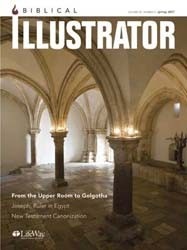
Biblical Illustrator is a resource anyone can use, however --even those who are not directly involved in these studies. The magazine itself has about twenty new articles each quarter, but the real goldmine of information is found on the CD which will add another seventy or so articles from past issues. These articles are in Adobe PDF format with full color (in most cases) pictures from archaeological digs or landscapes from biblical sites. Although the CD comes with a Macromedia-based graphical interface for accessing the articles according to lesson date, I tend to copy all of the PDF's over to my hard drive and then sort them by book of the BIble. Carrying them around with me on my laptop gives me quick access to information if I am working on a lesson or sermon, regardless of the curriculum context in which they were originally written.
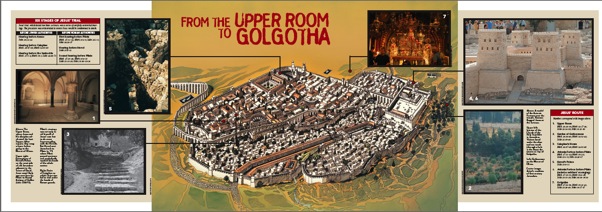
Spring 2007 New Articles:
"Village, Town or City" by G. Al Wright, Jr. (John 11:1-44)
"Peter's Eschatological Understanding" by Mark R. Dunn (1 Pet 4:7-19; 2 Pet 3:1-18)
"New Testament Canonization" by William Warren (2 Pet 3:1-18)
"Meekness: A Word Study" by Bill Patterson (Gal 5:13 - 6:5; Col 3:12-17)
"Joseph: Ruler in Egypt" by Harold R. Moseley (Gen 50:15-21)
"The Reality of Jesus' Resurrection" by Jerry Batson (Luke 24:1-49)
"With a Voice of Singing: Hymns in the Early Church" by Becky Lombard (Phil 2:5-11; Col 3:12-17).
"The Holy Mountain" by Lynn O. Traylor (2 Pet 1:12-21)
"Deserving of Death: Stoning in the Old Testament" by T. Van McClain (John 8:2-47)
"Cappadocia in the First Century" by Alan Ray Beuscher (1 Pet 1:1-12)
"All Your Conduct" by Terry Ellis (1 and 2 Peter)
"First Century Clothing" by Roberta Jones (1 Peter 3:1-12)
"First Century Teaching Practices" by Norma S. Hedin (John 8:2-47; 11:1-44; 13 - 19)
"Of Spices and Perfumes" by Argile A. Smith, Jr. (Jhn 18:1 - 19:42)
"Simon Peter: the Man and His Ministry" by Bobby Kelly (1 & 2 Peter)
"Signs in the Gospel of John" by Robert E. Jones (John 9:1-41; 11:1-44)
"The Role of a Steward" by Terry L. Wilder (1 Peter 4:7-19)
"The Pool of Siloam" by Stephen M. Ortiz (John 9:1-41)
"Peter's Use of Word Pictures" by Gregory T. Pouncy (1 & 2 Peter)
Book Review: George W.. Knight, The Illustrated Everyday Bible Companion. Reviewed by Jerry M. Windsor
ARTIfacts: "Gezer: A Sleeping Giant"
"From the Upper Room to Golgotha" --center spread (see above; John 13-19)
Articles from Previous Issues
"Where Jesus Ascended" by Lynn O. Traylor (Luke 24:1-53; Acts 1)
"The Riddle of Suffering" by Curtis Kent Horn, Jr (John 9:1-41)
"Raising Lazarus" by Bob Simmons (John 11:1-57)
"Describing the Enemy" by Lynn O. Traylor (John 10:1-42)
"Andrew: Just Peter's Brother?" by Steve Lemke (John 6:1-59)
"Passover in the First Century" by Robert Earl Jones (John 13; 14)
"Jesus' Last Week: Map and Chart"
"The Mount of Transfiguration" by Glen McCoy (Matt 17:1-13)
"Peter, Babylon, and Rome" by E. Randy Richards (1 Pet 1:1-12)
"Gnosticism" by Cecil Ray Taylor (1 John 3:1-5, 9-18)
"Faith Affirmed" by Timothy Trammell (1 John 5:1-12)
"Euodia and Syntyche" by Buelah Thigpen (Phil 4:2, 4-13, 16-19)
"The Life Situation and Purpose of 1 Peter" by Garland R. Young (1 Peter)
"Pilate's Power and Authority" by Sharon H. Gritz (Matt 28)
"The Background of Jesus' Covenant" by David E. Lanier (Matt 26:26-29)
"Peter's Messages" by Jerry N. Barlow (Acts 2; 3; 4; 5 10; 15)
"Women in Jesus' Ministry" by Julie Nall Knowles (Mark 15:40-41; John 20:1-18)
"First Century Women's Dress" by Mona Steward (1 Pet 3:1-12)
"Joseph and His Brothers" by Ken Cox, Jr. (Gen 50:15-21)
"Freedom and the Christian" by Larry McGraw (Matt 18:15-17; Gal 5:13-15; 6: 1-5)
"The Meaning of Violence" by Jerry McGraw (Gen 6:11-13; Ps 55:9-11; Jon 3:6-10; 1 Pet 3:9-12)
"God's Revelation in the Sinaitic Covenant" by Jerry W. Lee (Ps 99:9; Ex 19:1-12, 16, 18a; 1 Pet 1:13-16)
"Jesus and Peter--Peter's Use of Jesus' Teaching in His Letters" by Timothy Trammell (1 & 2 Peter)
"Sin, Iniquity, Transgression: What's the Difference" by John T. Bunn (Ps 51:1-2)
"Wine in the Roman World" by W. Murray Severance (1 Pet 4:3)
"Rome's Political System in the First Century" by Harold S. Songer (1 Pet 2:13-14)
"The New Testament Concept of Covenant" by Robert M. Shurden (1 Peter 2:9-10)
"Peter's Use of the Old Testament" by C. Alan Woodward (1 Peter)
"Aliens: A Study of Two Words" by James Wiles (1 Pet 1:1-12)
"Paul vs. Peter" by Mack Roark (Gal 2:1-21)
"A Christian Ethic of Business" by Paul N. Jackson (James 4:1-17)
"The Servant-Christ" by Bob Evans (Phil 2:1-13)
"Tetelestai" by Bennie R. Crockett Jr. (John 19:16-18, 28-30; 20:11-18)
"Jesus the Teacher" by Robert J. Dean (John 13:1-17)
"Jesus' Post-Resurrection Appearances" by Tony Tench (Luke 24:13-21a, 27, 30-35)
"Counselor: The Meaning" by Mark R. Dunn (John 14:15-31; 15:26-27; 16:5-15)
"Early Christian Eschatology" by Lynn Jones (1 Pet 4:7; 2 Pet 3:3)
"The Holy Spirit: A History of Interpretation" by Mikeal C. Parsons (Rom 5:5)
"Liberty" by Elmer L. Gray (Gal 5:13)
"The Early Church's Use of Messianic Passages" by Thomas D. Lea (Isa 53; Acts 28:23)
"Beams and Motes" by L. Milton Hankins (Matt 7:1-12)
"The Reality of Jesus' Resurrection" by Terry Ellis (Luke 23:24)
"Lazarus: All We Know" by D. Paul Smith (John 11:1)
"Pharisee!" by Dennis J. Horton (Luke 16:14; 18:10; John 9:40)
"Jesus' Use of Allegory" by Larry V. Crutchfield (John 10:9, 14)
"The Life of Simon Peter" by John Polhill (Luke 9:20)
"Judas Iscariot" All We Know" by Vernon O. Elmore (Luke 22:3; John 12:4)
"Hypocrite" by Elmer L. Gray (Matt 6:2)
"Herod Antipas: The Builder and Ruler" by Timothy N. Boyd (Luke 23:1-56)
"Slaves in First Century Israel" by R. Garland Young (John 15:1-17)
"A History of Footwashing" by Gary M. Poulton (John 13)
"Eyewitness Accounts in the New Testament" by Gary Hardin (2 Pet 1:12-21)
"The Counselor" by Bob Dean (John 14; 15; 16)
"The Spirit World in the First Century" by Paul N. Jackson (2 Pet 2:10b-11; col 2:18-19)
"Prayer: A Word Study" by Fred Howard (Ps 28:6-7; Col 4:2-4; 1 Thess 5:16-18; 1 Pet 5:6-7)
"Who Was the Adulterer?" by Rick Byargeon (Ex 20:14)
"Teachers in the First Century Church" by Bob Dean (Gal 6:1-10)
"Egyptian Culture in Joseph's Time" by Janice Meier (Gen 37:2-4, 26-28; 50:15-21)
"The Covenant with Israel" by Thomas J. Delaughter (Ex 19:4-6)
"The Meaning of Truth" by Terry Ellis (John 14:15-26; 16:5-15)
"The Meaning of Joy" by Kendell H. Easley (Phil 1:18 - 4:19)
"Idolatry in Colossians" by R. Garland Young (Col 3:1-17)
"Son of Man in John's Gospel" by Argile R. Smith, Jr. (John 1:19-51; 3; 5-6; 8-9; 12)
"Introducing John's Gospel" by Leslie Thomas Strong (John 1:1-18)
"The Feast of Dedication" by Elias Coye Still, III (John 10)
"Bethany" by William B. Tolar (John 11)
"Philip's and Peter's Missionary Work" (Acts 6:1 - 8:40)
"Peter's Miracles" by Charles W. Draper (Acts 3; 4; 5; 12)
"Controversy and Response" by C. Mack Roark (Acts 15:1-35)
The Biblical Illustrator Plus CD also contains an audio/video interview with SBTS professor, T. J. Betts regarding his recent participation in an archaeological dig in Hazor.
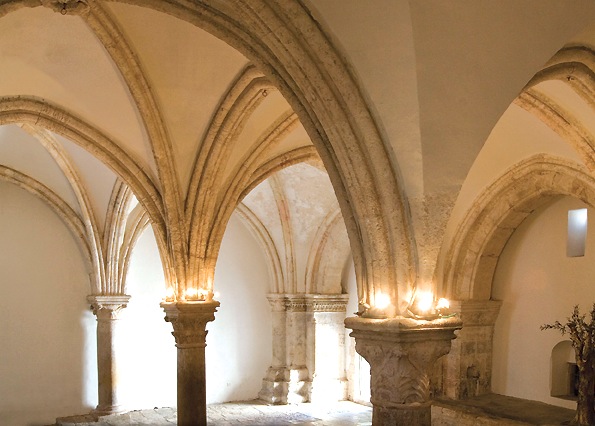
The cover of Biblical Illustrator contains the image above described internally as the "Traditional site of the Upper Room in Jerusalem, which was restored in the 14th century. The stone flooring is possibly, for the most part from the original flooring.
Subscriptions for Biblical Illustrator magazine ($24.95/4 issues) and Biblical Illustrator Plus CD ($34.35/4 discs) are available from the Lifeway website.
Biblical Illustrator: Winter 2006-2007
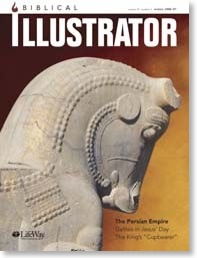
Biblical Illustrator contains background supplemental articles for teachers to accompany a number of Lifeway curriculum series including Bible for Life, Explore the Bible, MasterWork, and the January Bible Study.
Here are the articles for the new issue (which I'm having to manually type because the contents PDF is password protected and I can't copy and paste the names of the articles, [grumble, grumble]):
"Confidence: A Word Study" by Michael Priest
"Roads and Travel in the First Century" by Robert J. Priest
"Salvation: A Word Study" by Mark Rathel
"'In the Beginning': A Comparison of Genesis 1 and John 1" by R. D. Fowler
"Curses and Blessings in the Old Testament" by Wayne VanHorn
"Ancient Altars" by George H. Shaddix
"Reaching the Heavens: A Study of Ancient Towers" by Stephen J. Andrews
"John, Follower of Jesus" by Timothy Trammell
"A Man Named Nicodemus" by Randall L. Adkisson
"Galilee in Jesus' Day" by Mark R. Dunn
"Beside the Sea of Galilee" by Bill Patterson
Book Review: John E. Curtis, Nigel Tallis, Forgotten Empire: The World of Ancient Persia
"The Persian Empire" by Kelvin Moore
"Zerubbabel's Temple" by Conn Davis
"Ezra: Scribe and Priest" by Robert C. Dunston
"The King's 'Cupbearer'" by Kevin Peacock
"The Jerusalem Gates" by Gary P. Arbino
"Postexilic Hebrew Worship Practices" by G. B. Howell, Jr.
"Susa: Esther's Capital City" by Terry W. Eddinger
"Xerxes: King of Persia" by Stephen R. Miller
"The Feast of Persia" by Dorman Laird
The CD-ROM edition of Biblical Illustrator also comes with more than 70 related articles from previous issues:
"Tyre and Sidon" by George L. Kelm
"Ancient Persia" by Wayne Jones
"The River that Leads to Ahava" by LeMoine DeVries
"From Cyrus II to Darius I" by Harry B. Hunt
"The Role of Queen Esther" by Janice Meier
"Andrew: Just Peter's Brother" by Steve Lemke
"John's Use of 'Witness'" by John Polhill
"Antichrist in John's Letters" by Charles A. Ray, Jr.
"The Purpose and Life Situation of John's Letters" by Timothy Trammell
"Gnosticism" by Cecil Ray Taylor
"Introducing 1 John" by C. Mack Roark
"My Little Children" by Bennie R. Crockett
"Nebuchadnezzar" by Vernon O. Elmore
"Propitiation: A Word Study" by Hal Lane
"Friendship in the Old Testament" by Raymond Lloyd
"Babylonian and Persian Kings" by Daniel Caldwell
"John's Use of Logos" by Darryl Wood
"The Significance of Curses and Blessings" by Pamela J. Scalise
"Grotto of the Annunciation" by W. Murray Severance
"Flesh and Spirit: Romans 7:14 - 8:17" by George R. Beasley-Murray
"Son of Man in John's Gospel" by Argile A. Smith, Jr.
"Introducing John's Gospel" by Leslie Thomas Strong
"Ancient Near Eastern Flood Stories" by Francis X. Kimmitt
"Flesh and Spirit in John's Gospel" by Larry McGraw
"David's Dynasty" (unnamed author)
"The First Evangel" by Wayne VanHorn
"Noah's Life and Times" by Scott Langston
"First-Century Games" by Gary M. Poulton
"Enoch: Example of Faith" by James E. Carter
"God's Revelation in the Sinaitic Covenant" by Jerry W. Lee
"The Elect Lady" by Douglas C. Weaver
"The Arabians" by M. Dean Register
"Languages of the Ancient Near East" by Waylon Bailey
"Ahasuerus: His Life and Times" by A. O. Collins
"Heroes Between the Testaments" by Elmer L. Gray
"Shushan" by W. Murray Severance
"'Aliens': A Study of Two Words" by James Wiles
"Peter's Use of the Old Testament" by C. Alan Woodward
"In God's Image" by Harold R. Mosely
"Destroyed Relationships" by Rick Davis
"David's Kingdom" by Kevin C. Peacock
"A Booth" by Alan Moseley
"Immanuel" by Bennie R. Crockett, Jr.
"Moses' Snake in the Desert" by Leon Hyatt, Jr.
"The Meaning of 'God's Spirit Moved'" by Billy K. Smith
"Feast of Booths" by Vernon Elmore
"First Century Mirrors" by Kendall H. Easley
"First Century Slavery" by A. O. Collins
"Love's Abiding Nature" by John Mason
"Paradise" by Charles Ray
"A Walk Around the Walls with Nehemiah" by George L. Kelm
"Ritual Baths of the First Century" by Norma S. Hedin
"Hosea: the Man and His Message" by Leon Hyatt
"Perils of the Return" by Philip J. Swanson
"Simeon and Jesus" by Todd D. Still
"The Scriptures in Jesus' Day" by Rodney Reeves
"Hate/Murder" by Don H. Stewart
"Cain in the New Testament" by Gregory T. Pouncey
"Sanctification" by David S. Dockery
"Joseph: Mary's Husband" by R. D. Fowler
"Jerusalem Before the Return" by Jerry Lee
"Zerubbabel's Temple" by Donald W. Garner
"Enemies of Rebuilding Jerusalem" by Jerry W. Lee
"Messianic Expectations" in Intertestamental Judaism" by Carolyn Ratcliffe
"The Jewish World When Jesus Was Born" by Jeff S. Anderson
"Nehemiah Inspects Jerusalem's Walls" by Phillip J. Swanson
"Music in Celebration" by Becky Lombard
"The House of Herod" by D. Larry Gregg, Sr.
"The 'Word' in John's Gospel" by Sharon Gritz
"The Tower of Babel" by Phillip J. Swanson
"People Who Built the Temple" by Wayne VanHorn
The print edition of Biblical Illustrator is described on its website as "Well-researched articles related to LifeWay Sunday School lessons" with "[v]ivid portraits of Bible lands, people, and customs" plus "[m]aps, archaeological finds, and breathtaking color photos." The CD-ROM edition, Biblical Illustrator Plus "includes the current issue of Biblical Illustrator, quick access to over 200 pages of additional material, multiple articles for the current Sunday School lessons, and archived articles from previous issues of Biblical Illustrator."
The NIV Archaeological Study Bible: A Review
I served for five years as a chaplain and Bible teacher at a Christian high school. Whenever I got new groups of students, I always had to explain to them that our study of the Bible was not going to be like a Sunday School class where they showed up and heard nice stories. I informed them that our studies would be rooted in the surrounding history of the Bible because God's Word wasn't written separate from the culture where it originated. I especially liked it when I got comments such as "Hey, we've studied this in World Civ, too!" I've always felt it was important to connect the Bible to the history that surrounded it.
One of my graduating seniors, who had taken my classes for a couple of years, remarked, "Mr. Mansfield, I bet if a three-year-old was sitting in your lap and asked you why the sky was blue you would say to him, 'Well, first you have to understand the meaning of "sky" and "blue" from the viewpoint of ancient Mesopotamians in relation to their religious and political backgrounds. Only then will you begin to understand....'" I took that as a compliment. And this is why I like the ASB. Don't tell anyone, but at some point over the years much of my interests in biblical studies has shifted from theological priorities to those of a historical nature. Perhaps this is because I came to recognize that many of the theological errors that have come from some interpreters over the centuries are rooted in historical misunderstandings of the context(s) in which the Bible was written. The ASB will go a long way in preventing such errors.
The ASB is essentially a project from Gordon-Conwell Theological Seminary and published by Zondervan. Walter Kaiser is listed in the colophon (p. 2307) as the executive editor, and Duane Garrett (now at the Southern Baptist Theological Seminary) as the general editor and in charge of theological review. From what I've overheard, the bulk of the ASB was done by Dr. Garrett. The "About this Bible" section (pp. xii-xiii) at the beginning of the ASB demonstrate the purpose and value of this work:
The NIV Archaeological Study Bible focuses on the historical, literary and cultural context of the Bible. This context includes the history of people and places populating its pages, daily life in various periods and under widely diverse circumstances during Biblical times, and ancient texts that illuminate the Bible and the archaeology of the Biblical world. In addition the articles in this Bible devote particular attention to challenges archaeologists and Biblical scholars face on the critical issue of the trustworthiness of Scripture.
...
Many modern Christians shun the study of the ancient world for fear that scholars will make them aware of troubling facts that will serve only to undermine their faith in the Bible. In reality a careful study of the world of the Bible enhances our confidence in its historical accuracy and in its distinctiveness as the Word of God.
...
Further, many well-intentioned Christian readers, although not fully committed to a postmodern way of thinking, tend to interpret the Bible strictly in terms of their own experiences and standards, without ever considering what a prophet or apostle was saying to the people of his own day. An awareness of the beliefs conflicts, history and habits of the people of Biblical times forces us to confront questions like, "What did Paul actually mean when he wrote these words to the Corinthian Church?"
The ASB is a wealth of historical, cultural, literary, and archaeological information about Bible times. First there are 8,000 notes running along the bottom of the page like any regular study BIble. Most of these are a subset of the notes--specifically the historical and cultural notes--that run in Zondervan's NIV, NASB and TNIV Study Bibles. I would assume there may be some additional notes as well, but I didn't perform an in-depth comparison with the older works. But the study notes aren't where the strength of this Bible lies. Of immense value is collection of 500 short articles which are organized along the subcategories of archaeological sites, cultural and historical notes, ancient peoples and lands, reliability of the Bible and ancient texts and artifacts.
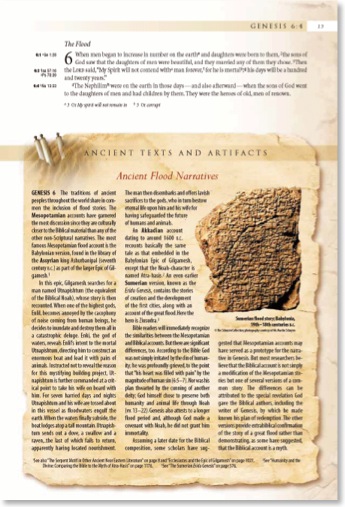
The average study Bible is aimed at a popular audience, and it's value is usually in it being a one-stop reference source. The ASB seems to be a step above the average popular study Bible, but that does not mean that it would not be accessible to the average Christian. In my experience teaching adults, I've found that there's great truth in the fear of delving into historical backgrounds because of some risk of undermining one's faith. I remember teaching a Sunday School class once where I suggested as a means of strengthening their faith that they read some non-biblical religious texts. There was almost a unanimous refusal to even consider this suggestion because they were afraid that it might make them doubt their faith. The ASB is not afraid to confront these issues and in fact shows the value of doing so. There are articles in the ASB on non-Biblical creation myths and flood stories. The documentary hypothesis receives full article treatment. And yet all this is done from a conservative-evangelical perspective with the goal of strengthening the reader's faith in the reliability of the Scriptures.
For me, I have no doubt that I have most, if not all of the information found in the ASB elsewhere in my library. But nowhere do I have this kind of information in one place so tightly tied to the biblical text as it is here. In my teaching, the ASB is a great first stop in research--much like the value of an encyclopedia. But also like an encyclopedia, this is a work that I can cheerfully become lost in. The articles are addictive--and there are 500 of them! Reading one is often not enough. I turn a page or two and there's something else that strikes my interest and I read that in some kind of biblical ADD response.
A few weeks ago, I gave myself a Saturday afternoon to sit in a local Starbucks and just explore the ASB to my heart's content. Some of what I write below came from my notes taken on that day, and some comes from my experience using this Bible as a reference in other teaching settings.
One feature of the ASB that I didn't mention above is the "Ancient Voices" that are scattered in the margins throughout the work. These are readings from genre-similar writings of the culture. At first it can be a bit odd to see pagan writings alongside biblical passages, but once the reader gets beyond this, he or she will be reminded that our Scriptures were not written in a cultural vacuum. When I was teaching from Song of Solomon a few weeks ago, I came across this ancient little ditty on p. 1036:
I will lie down inside,
and then I will feign illness.
Then my neighbors will enter to see,
and then my sister will come with them.
She'll put the doctors to shame
for she (alone) will understand my illness.
I love the mischievous playfulness in those lines, very much like the lines of the writer of the Song of Songs. There is a note at Song 4:9 explaining that sister "is a common term of endearment in the love poetry of the Ancient Near East," but unfortunately this explanation is six pages away from these lines. No doubt the uninitiated modern reader may not understand the use of sister in these lines and in Song of Solomon without this explanation. For my purposes, though, I wanted to know the source of the "Ancient Voices" lines. The only thing listed with the above-quoted passage was "Papyrus Harris," which did not tell me much. One might think the "Ancient Voices" segments would be listed or indexed somewhere in the back of the Bible. However, I finally found the source listed in the acknowledgments on p. xix. Although I thought this placement odd, I was delighted to see that the collection source for "Ancient Voices" comes from The Context of Scripture, edited by William W. Hallo and K. Lawson Younger. I was first introduced to these books a few years back in doctoral seminars with Daniel I. Block who always insisted that we must read Scripture in conjunction with other ancient literature.
In the front of the ASB there is an introductory essay on "The History of the Holy Land" which traces development from pre-Israelite culture through the modern day. Although the five-page article is brief, it will serve as a good introduction for many readers to the ongoing volatile nature of this region and the peoples who have inhabited it over the centuries. And if any reader is disappointed by the brevity of this article, perhaps this can be offset by the fact that the introductory article is cross-referenced throughout to many of the 500 other articles in the ASB. The introductory article also introduces the readers to the ASB's use of words in bold. Any word in bold in any of the articles is defined in a glossary at the back of the Bible. Unfortunately this bold highlighting is not applied to any of the 8,000 study notes, and I also noted that sometimes words listed in the glossary were not always bolded in the articles.
The ABS, like any good Bible, includes maps in the back--14 in all. Unfortunately, none of them are remarkable in any way related specifically to the other contents in this Bible. In fact, I believe they are just the same maps Zondervan includes in most of their other Bibles these days. I would have been interested to see perhaps maps of current archaeological digs, significant archaeological discoveries, important locations in Jerusalem, and even one detailing the proximity of the various Qumran caves to one another.
The map of the Exodus in the back only shows the "traditional" route (which is likely incorrect) and none of the other suggested routes in spite of the fact that the ASB contains excellent articles on other suggested routes of the Exodus: the northern route theory (p. 108), the southern route theory (p. 109) and the Arabian route theory (p. 112). Unfortunately no in-text maps display these routes, so it is left to the reader to plot these out alone. Related to this issue is an article (p. 123) that acknowledges disagreement by scholars on the exact location of Mt. Sinai (the traditional site which is the home of St. Catherine's Monastery is probably not the actual location). But again there is no map depicting alternative locations either in the text of the article or in the back of the Bible.
I admit that during my afternoon exploring and taking notes on the ASB, I ran out of time. Kathy came to get me before I got too far out of the Old Testament. But there is excellent treatment of the New Testament as well. For instance, there are articles on the Synoptic Problem and "Q" (p. 1685), the legend from the Middle Ages about the Needle's Eye Gate (it's thankfully debunked; p. 1594), the Pontius Pilate inscription (p. 1714), the use of the Septuagint in the New Testament (p. 1995) and so much more. Anyone interested in Greek and Roman history will especially appreciate many of the cultural articles in the ASB New Testament.
There are two main resources missing from the ASB that I wish it had. As I mentioned, study Bibles are good starting points for research or even good tools for quick reference. I wish that the editors had chosen to include bibliographies beyond merely the sources for which permissions were received. And it's really a shame that the NIV, the base text of the ASB, does not include the apocryphal/deuterocanonical books. Although I do not personally view these books as authoritative Scripture, they are important witnesses to the intertestamental time period, and I would have liked to have seen them get the standard ASB treatment. However, to the credit of the ASB, the subject index lists half a dozen articles strictly on the apocrypha and the intertestamental period just under the word apocrypha.
And truth be told, I don't see how the ASB could be any bigger than it is without going to two volumes. At two and a half inches thick and over four and a half pounds, it is easily the largest non-family Bible I own. However, it actually has fewer pages than the TNIV Study Bible. My hunch is thicker paper had to be used to accommodate the use of full-color printing. I have the hardback edition of the ASB (see Amazon link below), but it also comes in a variety of leather editions.
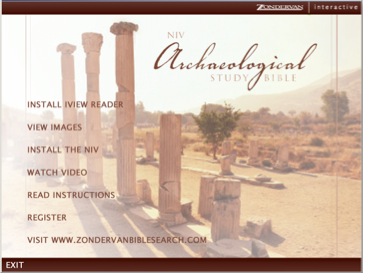
Of course, my greatest complaint about the CD is predictable if you know me--it's only for Windows! Don't tell Zondervan, but I was able to view it in Parallels Desktop on my MacBook, but it's not the same as running it natively. I don't believe that making the CD-ROM cross-platform would have been all that difficult. The CD's interface uses Macromedia Flash which is cross-platform already. The NIV text could have been included with Accordance Bible software for the Mac since Zondervan already partners with Accordance on a number of products. Finally, the Mac OS already includes its own image viewer, iPhoto. A simple script could have been used to import all the ASB image files into iPhoto. And that's what I did myself. I imported all 128 images into iPhoto and I even directed my system screensaver to the images. I'm already getting compliments from my students at IWU who want to know how to get that screensaver with biblical locations and artifacts!
Finally, I must say something about errors in the ASB. One of my readers has commented elsewhere that a number factual/technical errors througout this Bible. He said that in examining 12 pages he found 20 errors (or was that 12 errors on 20 pages?). I've done a couple of different Google searches, and I cannot find any definitive list of errors in the ASB, although I am not doubting that some errors in a work this ambitious must surely exist. The most egregious (to borrow a word used by someone else I pointed this out to) error I can specifically point to is an upside down Rosetta Stone on p. 101. This kind of error is a bit embarrassing, and maybe we can blame that on the graphic layout person
I have not taken the time to sift through the pages of the ASB and run fact checks. But my experience with this Bible so far makes me very enthusiastic about the project. I'm supportive enough to use it myself (it already has a permanent place on the shelf above my desk), recommend it to others, and we're even planning to give a copy to my brother-in-law for Christmas because he loves history (hopefully he's not reading this). I, too, love history and truly appreciate the application of it to the Scriptures as found in the ASB. The ASB would also make a great standard Bible for use in introductory New Testament and Old Testament courses in colleges and even seminaries.
I'll be interested to see if Zondervan eventually releases the Archaeological Study Bible in other translations besides the NIV, which is now almost three decades old. I'd be keen on a copy in the TNIV, and if it were released in a wide-margin edition, too...well, then I'd really be set.
Related: Archaeological Study Bible Website
Lifeway's Hidden Gem: Biblical Illustrator
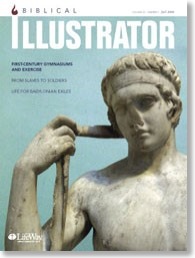
In the title I call Biblical Illustrator a hidden gem because I don't know how many Baptist Sunday School teachers are familiar with it. In fact, I think I'm the only person at my church who uses it. In the church I grew up in, Biblical Illustrator was standard fare among our teachers, but I haven't seen it used as widely in the churches of which I've been a part since coming to Kentucky.
Below is a listing of the contents from the current Fall issue of Biblical Illustrator. One thing you'll notice is that a number of different portions of the Bible are covered. Lifeway produces a variety of curriculums, and Biblical Illustrator provides background articles for three of them. If you've visited this blog in the last week or so, you'll know that the class I teach just started a study on the book of Hebrews. You'll note below that there are quite a few articles to aid my preparation, but I certainly don't mind having the other articles as well. I usually find myself reading the whole issue in addition to the articles from back issues available on the optional CDROM that I'll describe further down below.
|
Article Title |
Author |
Related Text |
|
Daily Life in
Biblical Times by Oded
Borowski |
McLemore, James
D. |
Book Review |
|
The Veil |
Bergen, Martha S. |
Hebrews 6; 9-10 |
|
From Slaves to
Soldiers |
Harris, John L. |
Joshua |
|
What's for
Supper? The First-Century Diet |
Gritz, Sharon |
Hebrews 5:11-6:12 |
|
"Better" in Hebrews |
Booth, Steve |
Hebrews |
|
First-Century
Gymnasiums and Exercise |
Simmons, Billy E. |
Timothy 4:6-16 |
|
Agricultural
Metaphors in the New Testament |
McCoy, Glenn |
Hebrews 5:11-6:12
|
|
Why Are 1 and 2
Timothy So Different? |
Weathers, Robert A. |
1 and 2 Timothy |
|
Who Were the "Officers"? |
Jenkins, David L. |
Joshua 1:1-15;
24:1-31 |
|
The Aim and
Message of Hebrews |
Smith, Argile A. |
Hebrews |
|
The Jordan River |
Register, Dean |
Hebrews 5:11-6:12 |
|
Life for the
Babylonian Exiles |
Hall, Kevin |
Isaiah 40-55 |
|
Moses in the Book
of Hebrews |
Jackson, Paul N. |
Hebrews |
|
Genealogies,
Myths, and Old Wives' Tales |
Chambers, Andy |
1 Timothy 1; 4; 2
Timothy 4 |
|
Seated at the
Right Hand |
Stewart, Don H. |
Hebrews 8:1-9:28 |
|
Ai |
Caldwell, Daniel
P. |
Joshua 7:1-25 |
|
In the Days of
Ahaz |
Newell, James |
Isaiah 7:1-9:7 |
|
Seizing Property |
Young, R. Garland |
Hebrews 10:19-39 |
|
Ephesus Through
Timothy's Eyes |
Gregg, D. Larry,
Sr. |
1 and 2 Timothy |
|
Ancient Weights
and Anchors |
Roark, C. Mack |
Hebrews
6:13-7:28; 12:1-29 |
|
ArtiFACTS:
Biblical Archaeology: Why Does It Really Matter Anyway? |
Drinkard, Joel
F., Jr. |
General Article |
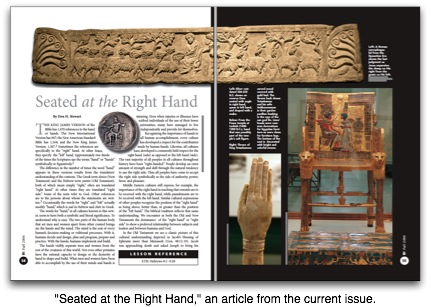
But wait...there's even more. Not too long ago, someone at Lifeway had the great idea to make each issue available on CDROM. Now, if you get Biblical Illustrator Plus, you not only get every article in the print magazine in PDF form but also between sixty and seventy articles from back issues! Each time I get a new copy of Biblical Illustrator Plus, it's like a mini-Christmas for me. Although the CDROM comes with an interface that will run on either a Macintosh or Windows system, that's generally not the way I use it. I move all the articles to my hard drive sorted into folders named after books of the Bible. In merely a year's time, that gives me access to hundreds of articles that I can use not only in Sunday School but other teaching venues as well.
If you teach Sunday School in a Baptist church, this is a must-have resource. However, even if you aren't Baptist, you might find great value in Biblical Illustrator. Subscriptions per year cost $20.55 for the print copy and $34.55 for the CDROM. If you teach in your church, you may be able to ask your minister of education to order this resource for you.
For further information:
• Biblical Illustrator (Print)
• Biblical Illustrator Plus (CDROM)
• Complete Article Index (1974-2006)










